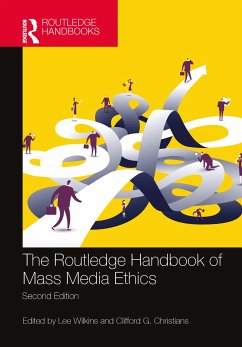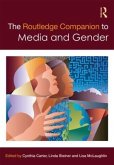The Routledge Handbook of Mass Media Ethics
Herausgeber: Wilkins, Lee; Christians, Clifford G.
The Routledge Handbook of Mass Media Ethics
Herausgeber: Wilkins, Lee; Christians, Clifford G.
- Gebundenes Buch
- Merkliste
- Auf die Merkliste
- Bewerten Bewerten
- Teilen
- Produkt teilen
- Produkterinnerung
- Produkterinnerung
This fully updated second edition of the popular handbook provides an exploration of thinking on media ethics, bringing together the intellectual history of global mass media ethics over the past 40 years, summarising existing research and setting future agenda grounded in philosophy and social science.
Andere Kunden interessierten sich auch für
![The Routledge Companion to Media and Poverty The Routledge Companion to Media and Poverty]() The Routledge Companion to Media and Poverty300,99 €
The Routledge Companion to Media and Poverty300,99 €![The Routledge Companion to Media and Class The Routledge Companion to Media and Class]() The Routledge Companion to Media and Class301,99 €
The Routledge Companion to Media and Class301,99 €![The Routledge Companion to Media Industries The Routledge Companion to Media Industries]() The Routledge Companion to Media Industries304,99 €
The Routledge Companion to Media Industries304,99 €![The Routledge Companion to Media & Gender The Routledge Companion to Media & Gender]() The Routledge Companion to Media & Gender352,99 €
The Routledge Companion to Media & Gender352,99 €![The Routledge Companion to Political Journalism The Routledge Companion to Political Journalism]() The Routledge Companion to Political Journalism303,99 €
The Routledge Companion to Political Journalism303,99 €![The Routledge Companion to Fashion Studies The Routledge Companion to Fashion Studies]() The Routledge Companion to Fashion Studies304,99 €
The Routledge Companion to Fashion Studies304,99 €![The Routledge Handbook of Language and the Global South/s The Routledge Handbook of Language and the Global South/s]() The Routledge Handbook of Language and the Global South/s303,99 €
The Routledge Handbook of Language and the Global South/s303,99 €-
-
-
This fully updated second edition of the popular handbook provides an exploration of thinking on media ethics, bringing together the intellectual history of global mass media ethics over the past 40 years, summarising existing research and setting future agenda grounded in philosophy and social science.
Hinweis: Dieser Artikel kann nur an eine deutsche Lieferadresse ausgeliefert werden.
Hinweis: Dieser Artikel kann nur an eine deutsche Lieferadresse ausgeliefert werden.
Produktdetails
- Produktdetails
- Verlag: Routledge
- 2. Auflage
- Seitenzahl: 552
- Erscheinungstermin: 31. März 2020
- Englisch
- Abmessung: 260mm x 183mm x 34mm
- Gewicht: 1221g
- ISBN-13: 9781138681323
- ISBN-10: 1138681326
- Artikelnr.: 59170072
- Herstellerkennzeichnung
- Libri GmbH
- Europaallee 1
- 36244 Bad Hersfeld
- gpsr@libri.de
- Verlag: Routledge
- 2. Auflage
- Seitenzahl: 552
- Erscheinungstermin: 31. März 2020
- Englisch
- Abmessung: 260mm x 183mm x 34mm
- Gewicht: 1221g
- ISBN-13: 9781138681323
- ISBN-10: 1138681326
- Artikelnr.: 59170072
- Herstellerkennzeichnung
- Libri GmbH
- Europaallee 1
- 36244 Bad Hersfeld
- gpsr@libri.de
Lee Wilkins is Professor Emerita at the Missouri School of Journalism and Wayne State University. Clifford G. Christians is Research Professor of Communications, Professor of Media Studies and Professor of Journalism Emeritus at the University of Illinois.
Introduction PART 1: FOUNDATIONS 1. A Philosophically Based Inquiry into
the Nature of Communicating Humans 2. A Short History of Media Ethics in
the United States 3. Essential Shared Values and 21st Century Journalism 4.
Moral Development: A Psychological Approach to Understanding Moral
Decision-Making 5. On the Unfortunate Divide Between Media Ethics and Media
Law 6. The Search for Universals 7. Justice in Media Ethics PART II:
PROFESSIONAL PRACTICE 8. Truth and Objectivity 9. Photojournalism Ethics: A
21st Century Primal Dance of Behavior, Technology, and Ideology 10. Why
Diversity Is an Ethical Issue 11. The Ethics of Advocacy: Moral Reasoning
in the Practice of Public Relations 12. The Ethics of Propaganda and the
Propaganda of Ethics 13. Exploring Latin American Advertising Ethics:
Legislation and Self-Regulation 14. Serious Moral Problems and Emerging
Ethical Issues in China's Media 15. Perspectives on Pornography Demand
Ethical Critique 16. Violence 17. The Eroding Boundaries Between News and
Entertainment and What They Mean for Democratic Politics 18. What Can We
Get Away With? The Ethics of Art and Entertainment in a Neoliberal World
19. Culture Is Normative PART 3: CONCRETE ISSUES 20. Justice as a
Journalistic Value and Goal 21. Transparency in Journalism: Meanings,
Merits, and Risks 22. Coercion, Consent, and the Struggle for Social Media
23. Digital Ethics in Autonomous Systems 24. Peace Journalism 25. Toward an
Institution-Based Theory of Privacy PART 4: INSTITUTIONAL CONSIDERATIONS
26. Islamic Reform for Democracy and Global Peace 27. Buddhist Moral
Ethics: Intend No Harm, Intend to Be of Benefit 28. Communitarianism 29.
Feminist Media Ethics 30. Spatial Ethics and Freedom of Expression 31.
Media Ownership in a Corporate Age 32. The Media in Evil Circumstances 33.
Ethical Tensions in News Making: What Journalism Has in Common with Other
Professions
the Nature of Communicating Humans 2. A Short History of Media Ethics in
the United States 3. Essential Shared Values and 21st Century Journalism 4.
Moral Development: A Psychological Approach to Understanding Moral
Decision-Making 5. On the Unfortunate Divide Between Media Ethics and Media
Law 6. The Search for Universals 7. Justice in Media Ethics PART II:
PROFESSIONAL PRACTICE 8. Truth and Objectivity 9. Photojournalism Ethics: A
21st Century Primal Dance of Behavior, Technology, and Ideology 10. Why
Diversity Is an Ethical Issue 11. The Ethics of Advocacy: Moral Reasoning
in the Practice of Public Relations 12. The Ethics of Propaganda and the
Propaganda of Ethics 13. Exploring Latin American Advertising Ethics:
Legislation and Self-Regulation 14. Serious Moral Problems and Emerging
Ethical Issues in China's Media 15. Perspectives on Pornography Demand
Ethical Critique 16. Violence 17. The Eroding Boundaries Between News and
Entertainment and What They Mean for Democratic Politics 18. What Can We
Get Away With? The Ethics of Art and Entertainment in a Neoliberal World
19. Culture Is Normative PART 3: CONCRETE ISSUES 20. Justice as a
Journalistic Value and Goal 21. Transparency in Journalism: Meanings,
Merits, and Risks 22. Coercion, Consent, and the Struggle for Social Media
23. Digital Ethics in Autonomous Systems 24. Peace Journalism 25. Toward an
Institution-Based Theory of Privacy PART 4: INSTITUTIONAL CONSIDERATIONS
26. Islamic Reform for Democracy and Global Peace 27. Buddhist Moral
Ethics: Intend No Harm, Intend to Be of Benefit 28. Communitarianism 29.
Feminist Media Ethics 30. Spatial Ethics and Freedom of Expression 31.
Media Ownership in a Corporate Age 32. The Media in Evil Circumstances 33.
Ethical Tensions in News Making: What Journalism Has in Common with Other
Professions
Introduction PART 1: FOUNDATIONS 1. A Philosophically Based Inquiry into
the Nature of Communicating Humans 2. A Short History of Media Ethics in
the United States 3. Essential Shared Values and 21st Century Journalism 4.
Moral Development: A Psychological Approach to Understanding Moral
Decision-Making 5. On the Unfortunate Divide Between Media Ethics and Media
Law 6. The Search for Universals 7. Justice in Media Ethics PART II:
PROFESSIONAL PRACTICE 8. Truth and Objectivity 9. Photojournalism Ethics: A
21st Century Primal Dance of Behavior, Technology, and Ideology 10. Why
Diversity Is an Ethical Issue 11. The Ethics of Advocacy: Moral Reasoning
in the Practice of Public Relations 12. The Ethics of Propaganda and the
Propaganda of Ethics 13. Exploring Latin American Advertising Ethics:
Legislation and Self-Regulation 14. Serious Moral Problems and Emerging
Ethical Issues in China's Media 15. Perspectives on Pornography Demand
Ethical Critique 16. Violence 17. The Eroding Boundaries Between News and
Entertainment and What They Mean for Democratic Politics 18. What Can We
Get Away With? The Ethics of Art and Entertainment in a Neoliberal World
19. Culture Is Normative PART 3: CONCRETE ISSUES 20. Justice as a
Journalistic Value and Goal 21. Transparency in Journalism: Meanings,
Merits, and Risks 22. Coercion, Consent, and the Struggle for Social Media
23. Digital Ethics in Autonomous Systems 24. Peace Journalism 25. Toward an
Institution-Based Theory of Privacy PART 4: INSTITUTIONAL CONSIDERATIONS
26. Islamic Reform for Democracy and Global Peace 27. Buddhist Moral
Ethics: Intend No Harm, Intend to Be of Benefit 28. Communitarianism 29.
Feminist Media Ethics 30. Spatial Ethics and Freedom of Expression 31.
Media Ownership in a Corporate Age 32. The Media in Evil Circumstances 33.
Ethical Tensions in News Making: What Journalism Has in Common with Other
Professions
the Nature of Communicating Humans 2. A Short History of Media Ethics in
the United States 3. Essential Shared Values and 21st Century Journalism 4.
Moral Development: A Psychological Approach to Understanding Moral
Decision-Making 5. On the Unfortunate Divide Between Media Ethics and Media
Law 6. The Search for Universals 7. Justice in Media Ethics PART II:
PROFESSIONAL PRACTICE 8. Truth and Objectivity 9. Photojournalism Ethics: A
21st Century Primal Dance of Behavior, Technology, and Ideology 10. Why
Diversity Is an Ethical Issue 11. The Ethics of Advocacy: Moral Reasoning
in the Practice of Public Relations 12. The Ethics of Propaganda and the
Propaganda of Ethics 13. Exploring Latin American Advertising Ethics:
Legislation and Self-Regulation 14. Serious Moral Problems and Emerging
Ethical Issues in China's Media 15. Perspectives on Pornography Demand
Ethical Critique 16. Violence 17. The Eroding Boundaries Between News and
Entertainment and What They Mean for Democratic Politics 18. What Can We
Get Away With? The Ethics of Art and Entertainment in a Neoliberal World
19. Culture Is Normative PART 3: CONCRETE ISSUES 20. Justice as a
Journalistic Value and Goal 21. Transparency in Journalism: Meanings,
Merits, and Risks 22. Coercion, Consent, and the Struggle for Social Media
23. Digital Ethics in Autonomous Systems 24. Peace Journalism 25. Toward an
Institution-Based Theory of Privacy PART 4: INSTITUTIONAL CONSIDERATIONS
26. Islamic Reform for Democracy and Global Peace 27. Buddhist Moral
Ethics: Intend No Harm, Intend to Be of Benefit 28. Communitarianism 29.
Feminist Media Ethics 30. Spatial Ethics and Freedom of Expression 31.
Media Ownership in a Corporate Age 32. The Media in Evil Circumstances 33.
Ethical Tensions in News Making: What Journalism Has in Common with Other
Professions








